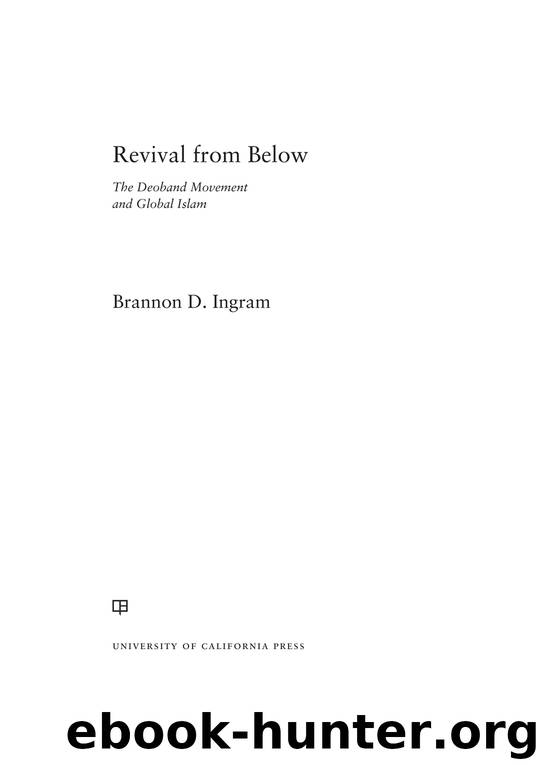Revival From Below by Brannon D Ingram

Author:Brannon D Ingram [Ingram, Brannon D]
Language: eng
Format: epub
ISBN: 9780520970137
Publisher: University of California Press
Published: 0101-01-01T00:00:00+00:00
The masses have made it their business to form opinions of their own on religious controversies [masa’il]. Why do they find it necessary to arbitrate over differences among the men of knowledge [ahl-i ‘ilm], over intellectual issues and reasoning, when they lack the capacities to do so? In such arbitrations and decisions, they ought to follow the true ‘ulama, whose sound beliefs and piety are born of experience and whose credentials as men of God are established. But this is not their intention. Their intention is to engage in disputes. In such assemblies, in such public discourses, the masses find no gratification unless others are reviled, unless others are criticized, unless others are publicly disgraced. The masses find assemblies in which religious topics are explained in a straightforward manner to be dull [phika] and insipid [be maza].74
That is, the masses want disputation (munazara), not religious lectures. They want entertainment, not edification.
But in weighing the risks of popular preaching with the need for mass reform, Deobandis mostly gave a preference to the latter. Sometime in the late 1960s, no less a figure than Qari Muhammad Tayyib gave an impassioned speech in defense of the Tablighis.75 In Tayyib’s view, the Tablighis are a direct extension of the entire Deobandi philosophy of companionship (suhbat) with the pious. Like Gangohi and others, he referenced the Prophet’s ability to turn an idolater into a Muslim instantaneously through the affective power of his mere presence. The history of Islam is, for Tayyib, the nostalgic attempt to re-create that affect and apply it to the task of self-reform (islah-i nafs).76 As other Deobandis note again and again, Tayyib, too, comments that the best means of self-reform is through finding a Sufi master to be one’s guide. But what if a master is unavailable? The Tablighi Jama‘at, he suggests, offers the most elegant solution to that problem. To illustrate this idea, Tayyib drew on al-Ghazali, who proposed four means for doing self-reform when one cannot find a master. The four-part typology moves inward from society to complete solitude: first, one should seek companionship with other “men of God” (suhbat-i ahl Allah) to aid in self-reform; second, if such companionship is not possible, one should find pious friends (intikhab-i dost); third, if one cannot find such friends, one should let the fault-finding of one’s enemies guide one toward awareness of what needs to be reformed; finally, one should engage in self-reform through rigorous self-interrogation (muhasaba). “Suppose one says, ‘I am on a mountaintop. I have neither the companionship of a master, nor friends, nor enemies. How am I to reform myself’?” Tayyib asks rhetorically. Paraphrasing al-Ghazali, he replies that such a person can still spend time every day in introspection and gratitude (shukr).77 But Tayyib brings his argument back around to the Tablighi Jama‘at: they exemplify all four forms of self-reform. “So when one goes out for tabligh, he is in the company of holy men, and he is amid good friends who prevent one another from doing evil.”78
Download
This site does not store any files on its server. We only index and link to content provided by other sites. Please contact the content providers to delete copyright contents if any and email us, we'll remove relevant links or contents immediately.
| Africa | Americas |
| Arctic & Antarctica | Asia |
| Australia & Oceania | Europe |
| Middle East | Russia |
| United States | World |
| Ancient Civilizations | Military |
| Historical Study & Educational Resources |
The Sympathizer by Viet Thanh Nguyen(4390)
The Rape of Nanking by Iris Chang(4213)
World without end by Ken Follett(3477)
Ants Among Elephants by Sujatha Gidla(3467)
Blood and Sand by Alex Von Tunzelmann(3205)
Japanese Design by Patricia J. Graham(3175)
The Queen of Nothing by Holly Black(2599)
City of Djinns: a year in Delhi by William Dalrymple(2555)
Foreign Devils on the Silk Road: The Search for the Lost Treasures of Central Asia by Peter Hopkirk(2464)
India's Ancient Past by R.S. Sharma(2454)
Inglorious Empire by Shashi Tharoor(2438)
Tokyo by Rob Goss(2429)
In Order to Live: A North Korean Girl's Journey to Freedom by Yeonmi Park(2392)
Tokyo Geek's Guide: Manga, Anime, Gaming, Cosplay, Toys, Idols & More - The Ultimate Guide to Japan's Otaku Culture by Simone Gianni(2373)
India's biggest cover-up by Dhar Anuj(2354)
The Great Game: On Secret Service in High Asia by Peter Hopkirk(2349)
Goodbye Madame Butterfly(2253)
Batik by Rudolf Smend(2185)
Living Silence in Burma by Christina Fink(2071)
